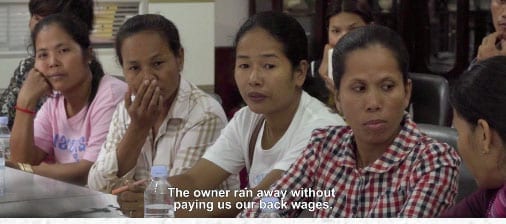
May 22, 2017
Knowing that conditions in garment factories around the world should be improved is not the same as seeing those workplaces firsthand and talking with garment workers about their daily experiences on the job, as three Parsons Design students found out when they traveled from New York City to Cambodia.
“Hearing their stories, and seeing that they are more than just a number, was something that was really eye-opening,” says Allison Griffin, a dual fashion-journalism major who took part in a video project by Re/Make, a U.S.-based non-profit organization focused on ethical production of clothes and other other garments.
Griffin, Casey Barber and Anh Le, all of whom graduated last week, met last fall with garment workers like the woman who described the high penalty she faces for making a mistake when assembling garments.
“If there are 12 pieces and I forget to put a code on one piece, they don’t pay me for any of them,” she says. “I get nothing for that day.”
She is among some of the more than 200 women whose employer last July abruptly closed the knitwear plant where some of them had worked for up to 18 years, leaving the workers without jobs or the more than $500,000 in compensation owed them.
Low Wages, Unsafe Conditions for Workers in Global Supply Chain
The tragedy of their story goes beyond a single knitwear plant in Phnom Penh. Workers throughout the global supply chain that fuels multinational corporations often face poverty wages, dangerous and unsafe working conditions, eroding rights on the job—and employers who find it all-too easy to abandon a plant in one country, only to open another elsewhere.
The students also met Sreyneang, a garment worker who invited the students to her home, where they met her two daughters whom she is supporting because her husband is unable to work.
“Every day when I finish my work (at one factory), I have to work at other factories until 9 or 10 p.m.,” says Sreyneang. “I walk home late.”
Sreyneang expressed hope the video can help improve the working conditions of Cambodia’s garment workers.
“It’s a lot to handle,” says Barber, speaking through tears on the video. “But hopefully we can make people understand and make change.”
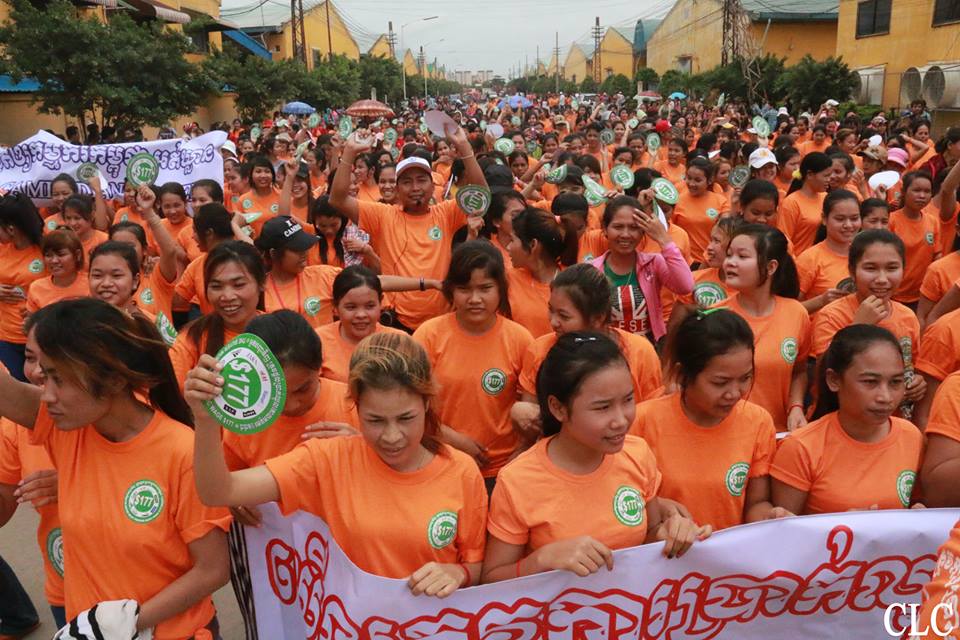
Mar 29, 2017
Cambodia’s draft minimum wage law would prohibit unions and other civil-society organizations from contesting the country’s minimum wage and would go so far as to restrict their ability to even conduct research to craft minimum wage options, according to a legal analysis by the Solidarity Center and its partners.
“As it stands, the draft could potentially criminalize all forms of protest in relation to the minimum wage, which has been the motivation for some of the biggest demonstrations in recent memory,” says Chak Sopheap, executive director of the Cambodian Center for Human Rights (CCHR), which analyzed the draft.
“It is an affront to the constitutionally protected fundamental freedoms of expression, association and assembly, and must not proceed,” he says. (The analysis is available in English and Khmer.)
The law also would exclude many categories of workers, including domestic workers, civil servants, some transportation workers and workers in the informal economy.
Draft Law Blocks Worker & Union Input
“The government has routinely criminalized legitimate trade union conduct, in violation of international human rights law. The vague prohibition of ‘illegal acts’ in regard to pressuring the government over the minimum wage would seriously undermine the legitimate work of labor activists,” explains Jeff Vogt, legal director of the Solidarity Center’s rule of law department.
The analysis also notes that the draft law’s processes for wage-setting do not guarantee union participation and give significant discretion to the labor minister to set minimum wages based on employment sector and geographic region, which threatens “to undercut the objectives and spirit of the law.”
Minimum Wage for Garment Workers Not a Living Wage
In recent years, tens of thousands of garment workers across Cambodia, most of them women, waged a series of mass protests demanding a living wage.
A 2015 study of garment workers and their expenditures, conducted by labor rights groups, including the Solidarity Center, indicated that garment workers earned far less than they need to cover expenses. Although the minimum wage for garment and footwear workers rose this year to $153 per month, up from $140, some union representatives says it still falls far short of a fair living wage.
The analysis recommends amendments and additions to the draft law that would bring it in line with international human rights law and constitutional human rights guarantees. The Solidarity Center, CCHR and the International Trade Union Confederation (ITUC) compared the draft law with international standards and best practices, including the International Covenant on Civil and Political Rights, the International Covenant on Economic, Social and Cultural Rights, and International Labor Organization conventions.
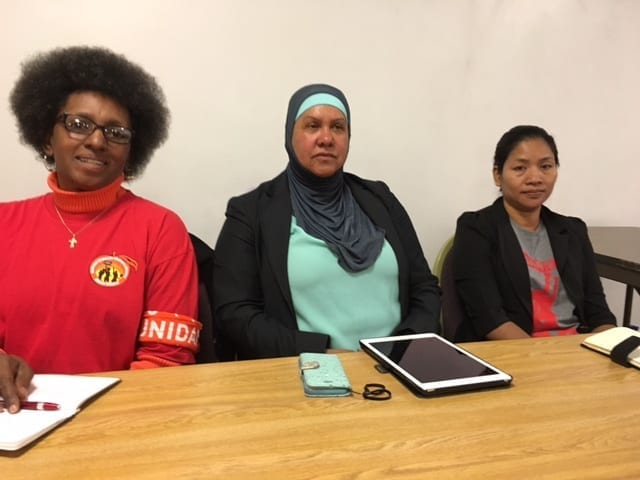
Mar 15, 2017
Women’s economic empowerment is linked to achieving broader labor rights for workers around the globe and women must join together no matter what their interests or jobs to bring about gender equality at work, panelists said today at an AFL-CIO panel in New York City.

AFL-CIO International Affairs Director Cathy Feingold moderated the panel “Building Power for Women Workers in the Changing World of Work.” Credit: Solidarity Center/Tula Connell
“We’re not talking about ‘women’s rights’ and ‘worker rights’—it’s one agenda that we need to bring together so we really can have women’s economic power in the world of work,” said AFL-CIO International Affairs Director Cathy Feingold, who moderated the panel. “We cannot be divided.”
Three union activists shared their experiences in helping women achieve a voice at work during “Building Power for Women Workers in the Changing World of Work.” The panel is one of several sessions the Solidarity Center and its partners are holding in conjunction with the March 13–24 meeting of the United Nations Commission on the Status of Women (CSW).
On Monday, the Solidarity Center and International Trade Union Confederation (ITUC) held panels examining the prevalence of gender-based violence at work and mobilization strategies for championing passage of an International Labor Organization (ILO) convention preventing gender-based violence on the job.
‘We Women Have to Do It’
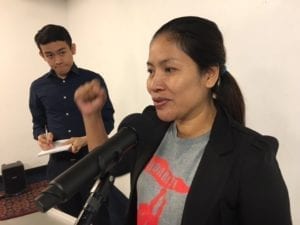
“We cannot wait for men to help us. We women have to do it”—Sophorn Yang, Cambodian garment worker organizer. Credit: Solidarity Center/Tula Connell
Sophorn Yang, a garment worker organizer in Cambodia, fired up the dozens of union activists and allies in the audience when she said,
“I’m happy to be here in room full of woman power!”
Yang discussed garment workers’ long struggle for decent wages, including a series of massive demonstrations in 2015 and 2016 in which several garment workers were killed by police and others beaten and arrested.
An estimated 700,000 workers in Cambodia sew and package more than $5 billion worth of clothing, textiles and shoes every year, nearly all on short-term contracts that make it easier to fire and control workers.
Yet even though nearly all garment workers are women, Yang said she is constantly challenged by male union leaders.
“In my country, the majority of leaders undermine my values because I am a woman,” Yang said, speaking through a translator. “They don’t know I have the will power to fight, especially in a sector where 90 percent of women workers are underrepresented, are under attack.
“We cannot wait for men to help us. We women have to do it.”
‘Organize, Build Coalitions, Work in Cooperation’
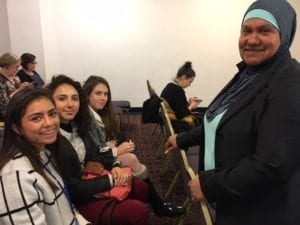
“There are more things we have in common than what divides us”—Sussie Lozada, UNITE Local 100 political director. Credit: Solidarity Center/Tula Connell
Two union activists from the United States emphasized the importance of organizing workers, joining with allies and reaching women in all job sectors and interests to build networks to strengthen women’s struggles on the job.
“We have the power to organize,” said Sussie Lozada, political director of UNITE Local 100. “Organize, build coalitions, work in cooperation—all are fundamental for us to grow and get what we want.
“There are more things we have in common than what divides us.”
Patricia Sauls, a domestic worker and leader of the Atlanta chapter of National Domestic Workers Alliance (NDWA), said joining a union empowered her to believe she could make positive change at work for herself and for other domestic workers.
“My union encouraged me to believe I do have a voice,” she said, telling participants that she was speaking publicly for the first time. “I am just so grateful for the sisterhood that is here to support me and stand by me.”
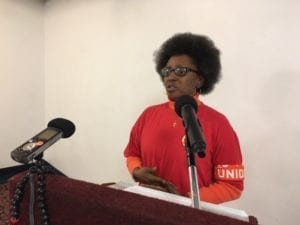
“My union encouraged me to believe I do have a voice”—Patricia Sauls, NDWA activist. Credit: Solidarity Center/Tula Connell
Sauls is part of a global delegation sponsored by the International Domestic Workers Federation (IDWF), which is mobilizing members around issues like preventing gender-based violence at work.
Joining the panel from different continents and diverse experiences, Sauls and Yang carried similar messages for their union sisters:
“We can win if we stay together and support each other,” said Sauls.
And as Yang said, “We need to come together to organize and fight, with passion, with real passion!”
Hundreds of high-level government delegates at the CSW for the first time are discussing women’s economic empowerment and the role of labor unions as core to achieving women’s rights—a huge milestone for working women around the globe in achieving recognition of their workplace struggles by the world’s human rights body—and one that worker rights organizations like the ITUC and Solidarity Center have long championed.
Follow us here, on Facebook and on Twitter @SolidarityCntr for coverage of our final event on Thursday, “Impact of Corporate Power to Women’s Economic Empowerment,” a panel sponsored by the Association for Women’s Rights in Development (AWID) and Solidarity Center.
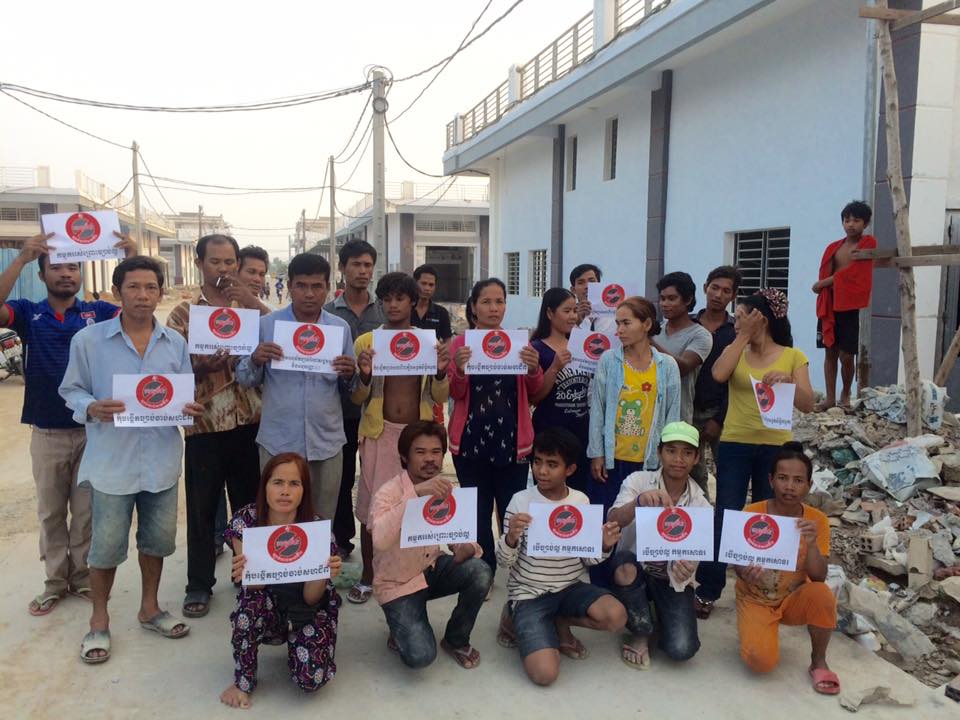
Mar 30, 2016
Workers across Cambodia are waging rallies to protest a draft labor law that, according to the International Trade Union Confederation (ITUC), does not meet basic worker rights standards under international law.
Carrying signs reading, “Do not create a law that oppresses worker rights” and “Workers survive because of good laws,” workers are taking a stand against the law that, if passed, would violate International Labor Organization (ILO) standards on freedom of association and protection for the right to form unions (Convention 87) and the right to bargain collectively (Convention 98).
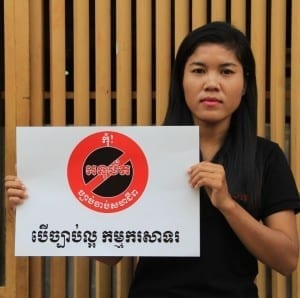
Cambodia’s draft labor law would make it easier for the government to break up unions. Credit: Um Mumsreypech
Workers from a wide variety of jobs also are posting on Facebook images of themselves and their co-workers with signs urging the government to pass a law that respects the rights of workers. (You also can follow the actions on Twitter with the hashtag #SayNoUnionLaw.)
In a letter sent this month to Cambodian Prime Minister Hun Sen, ITUC General Secretary Sharan Burrow urged the Cambodian government to work with unions to ensure the law is consistent with international labor standards. “We shall oppose any law which does not fully respect these rights,” Burrow wrote.
For instance, a strike would be legal only if approved by more than 50 percent of participants at a union meeting where more than half the union members are present—effectively making strikes impossible for unions with several thousand members.
The strike provision would especially impact the nation’s 700,000 garment workers, limiting their ability to seek improvements at the workplace. A Human Rights Watch report last year found that many Cambodian garment factories repeatedly violated fundamental worker rights, such as issuing unlawful short-term contracts to intimidate and control workers, and to avoid paying maternity leave and other benefits to the predominantly female workforce.
Ath Thorn, president of the Coalition of Cambodian Apparel Workers Democratic Union, told The Cambodia Daily that the limitations on calling a strike are a big concern. “In the Constitution, even one person can make a strike or demonstration,” he said. The Constitution says the right to strike and demonstrate “shall be exercised within the framework of law.”
The draft law also would enable courts to break up unions for infractions committed by a union leader.
Workers and their unions, along with community advocates, had worked on a draft trade union law several years ago that incorporated fundamental worker rights, but the draft died on the desks of the Council of Ministers. Cambodia union leaders say the current draft was compiled with minimal input from workers and their unions. It now goes before the National Assembly April 4.
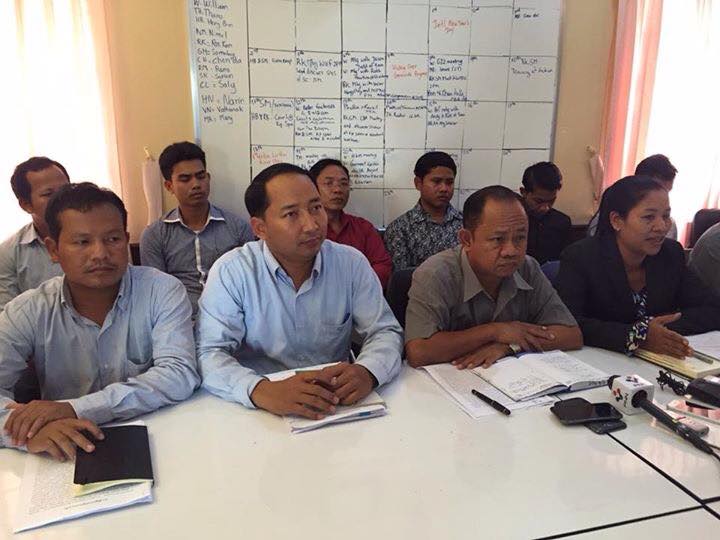
Jan 20, 2016
Union leaders are asking the Cambodia Royal Government and National Assembly to suspend adoption of a pending trade union law because of restrictions it would place on the freedom to form unions, collectively bargain and strike.
Following a strategy meeting today chaired by the International Trade Union Confederation Cambodia Coordinating Council, a dozen union leaders issued a joint statement calling on parliament to accept the group’s 17 previously submitted proposals. Unions want to see the draft labor law expanded to cover domestic workers, civil servants, state employees and informal economy workers, and seek more protections for the right to form unions and bargain collectively, in accordance with international labor standards.
The law “visibly restricts” worker rights that are recognized by the International Labor Organization (ILO), including the freedoms to form unions and bargain collectively, the unions said in a statement released at a press conference following their meeting.
The unions added that is essential to align Cambodian law with the international conventions it has ratified, including ILO conventions, as well as for promoting “the interests of all the workers and society, as well as our next generation.”
Union leaders have met several times with members of the Special Committee of the Parliament in charge of drafting the law, but say their detailed responses and recommendations have not been seriously considered.










